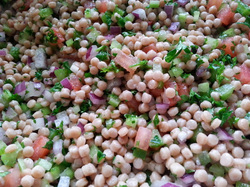One of the challenges that comes with eating all (or more) whole plant-based foods comes in the beginning due to all the fiber you’re getting that your body is probably not quite used to. Think of fiber as a scrub brush that cleans out your intestinal tract, helping your body absorb nutrients while moving out the waste.
Fiber is a complex carbohydrate that our bodies cannot digest. When undigested carbohydrates reach our colon, any soluble fiber (and undigested sugars) gets broken down by bacteria in our colon, which produces gas.
Break wind, pass gas, cut one, let one rip, cut the cheese, fart. Whatever you call it, we’ve all done it. In fact, according to the National Digestive Diseases Information Clearinghouse (NDDIC), on average we produce between one and four pints of gas every day and we pass gas between 13 and 21 times per day.
The NDDIC points out that the more sulfur your gas contains, the more odor it has. As it turns out, most animal-based proteins happen to have more sulfur-containing amino acids than plant-based proteins. So meat- and dairy-eaters pass smellier gas than whole plant-based eaters.
If you go straight from the Standard American Diet to a whole foods plant-based diet, you are most likely going to experience a lot of gas and discomfort that can last for several weeks. Eventually your body will adjust and you will stop experiencing excess gas and discomfort.
Whether you’re goal is to switch completely over to a whole foods plant-based diet or just to increase the amount of whole plant-based foods in your diet, it’s best to gradually increase your intake of whole plant-based foods over several weeks to give your body time to adjust. And be sure to drink plenty of water.







 RSS Feed
RSS Feed